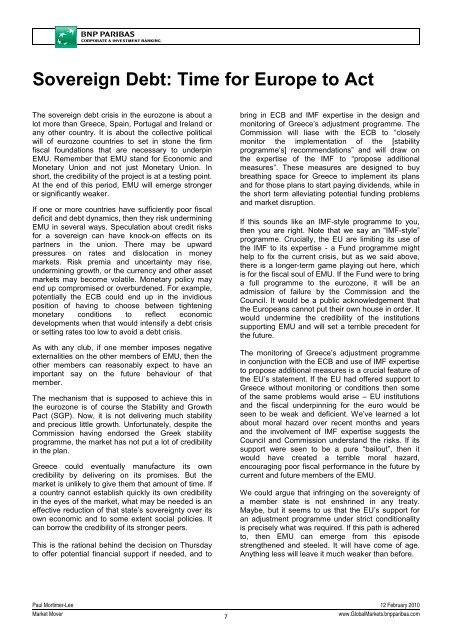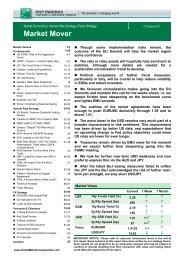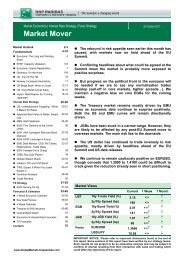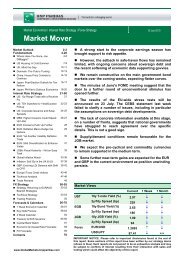Market Mover - BNP PARIBAS - Investment Services India
Market Mover - BNP PARIBAS - Investment Services India
Market Mover - BNP PARIBAS - Investment Services India
Create successful ePaper yourself
Turn your PDF publications into a flip-book with our unique Google optimized e-Paper software.
Sovereign Debt: Time for Europe to Act<br />
The sovereign debt crisis in the eurozone is about a<br />
lot more than Greece, Spain, Portugal and Ireland or<br />
any other country. It is about the collective political<br />
will of eurozone countries to set in stone the firm<br />
fiscal foundations that are necessary to underpin<br />
EMU. Remember that EMU stand for Economic and<br />
Monetary Union and not just Monetary Union. In<br />
short, the credibility of the project is at a testing point.<br />
At the end of this period, EMU will emerge stronger<br />
or significantly weaker.<br />
If one or more countries have sufficiently poor fiscal<br />
deficit and debt dynamics, then they risk undermining<br />
EMU in several ways. Speculation about credit risks<br />
for a sovereign can have knock-on effects on its<br />
partners in the union. There may be upward<br />
pressures on rates and dislocation in money<br />
markets. Risk premia and uncertainty may rise,<br />
undermining growth, or the currency and other asset<br />
markets may become volatile. Monetary policy may<br />
end up compromised or overburdened. For example,<br />
potentially the ECB could end up in the invidious<br />
position of having to choose between tightening<br />
monetary conditions to reflect economic<br />
developments when that would intensify a debt crisis<br />
or setting rates too low to avoid a debt crisis.<br />
As with any club, if one member imposes negative<br />
externalities on the other members of EMU, then the<br />
other members can reasonably expect to have an<br />
important say on the future behaviour of that<br />
member.<br />
The mechanism that is supposed to achieve this in<br />
the eurozone is of course the Stability and Growth<br />
Pact (SGP). Now, it is not delivering much stability<br />
and precious little growth. Unfortunately, despite the<br />
Commission having endorsed the Greek stability<br />
programme, the market has not put a lot of credibility<br />
in the plan.<br />
Greece could eventually manufacture its own<br />
credibility by delivering on its promises. But the<br />
market is unlikely to give them that amount of time. If<br />
a country cannot establish quickly its own credibility<br />
in the eyes of the market, what may be needed is an<br />
effective reduction of that state’s sovereignty over its<br />
own economic and to some extent social policies. It<br />
can borrow the credibility of its stronger peers.<br />
This is the rational behind the decision on Thursday<br />
to offer potential financial support if needed, and to<br />
bring in ECB and IMF expertise in the design and<br />
monitoring of Greece’s adjustment programme. The<br />
Commission will liase with the ECB to “closely<br />
monitor the implementation of the [stability<br />
programme’s] recommendations” and will draw on<br />
the expertise of the IMF to “propose additional<br />
measures”. These measures are designed to buy<br />
breathing space for Greece to implement its plans<br />
and for those plans to start paying dividends, while in<br />
the short term alleviating potential funding problems<br />
and market disruption.<br />
If this sounds like an IMF-style programme to you,<br />
then you are right. Note that we say an “IMF-style”<br />
programme. Crucially, the EU are limiting its use of<br />
the IMF to its expertise - a Fund programme might<br />
help to fix the current crisis, but as we said above,<br />
there is a longer-term game playing out here, which<br />
is for the fiscal soul of EMU. If the Fund were to bring<br />
a full programme to the eurozone, it will be an<br />
admission of failure by the Commission and the<br />
Council. It would be a public acknowledgement that<br />
the Europeans cannot put their own house in order. It<br />
would undermine the credibility of the institutions<br />
supporting EMU and will set a terrible precedent for<br />
the future.<br />
The monitoring of Greece’s adjustment programme<br />
in conjunction with the ECB and use of IMF expertise<br />
to propose additional measures is a crucial feature of<br />
the EU’s statement. If the EU had offered support to<br />
Greece without monitoring or conditions then some<br />
of the same problems would arise – EU institutions<br />
and the fiscal underpinning for the euro would be<br />
seen to be weak and deficient. We’ve learned a lot<br />
about moral hazard over recent months and years<br />
and the involvement of IMF expertise suggests the<br />
Council and Commission understand the risks. If its<br />
support were seen to be a pure “bailout”, then it<br />
would have created a terrible moral hazard,<br />
encouraging poor fiscal performance in the future by<br />
current and future members of the EMU.<br />
We could argue that infringing on the sovereignty of<br />
a member state is not enshrined in any treaty.<br />
Maybe, but it seems to us that the EU’s support for<br />
an adjustment programme under strict conditionality<br />
is precisely what was required. If this path is adhered<br />
to, then EMU can emerge from this episode<br />
strengthened and steeled. It will have come of age.<br />
Anything less will leave it much weaker than before.<br />
Paul Mortimer-Lee 12 February 2010<br />
<strong>Market</strong> <strong>Mover</strong><br />
7<br />
www.Global<strong>Market</strong>s.bnpparibas.com
















